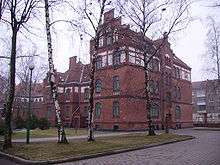Klaipėda University
| Klaipėdos Universitetas | |
.jpg) | |
| Type | Public |
|---|---|
| Established | 1991[1] |
Administrative staff | 600 |
| Students | ~5800[2] |
| Location | Klaipėda, Lithuania |
| Campus | Urban |
| Website | http://www.ku.lt/ |
|
| |
Klaipėda University (Lithuanian: Klaipėdos Universitetas or KU) is a university in the Lithuanian seaport Klaipėda.
Overview
The University was formally founded on January 1, 1991 by a decree of Seimas (Lithuanian Parliament). The new university incorporated existing institutions of higher education in the city.[3] At its inception, it comprised 3,000 students and three faculties (Humanities and natural sciences, Marine Engineering, and Pedagogy).[3] It has since grown to seven faculties and eight institutes: faculties of Natural Science and Mathematics, Humanities, Marine Engineering, Art, Pedagogy, Social Sciences, and Health Sciences; Maritime Institute, Seascape Institute, Institute of Continuing Studies, Coastal Research and Planning Institute, Institute of Baltic Sea Region History and Archaeology, Institute of Regional Policy and Planning, Mechatronics Institute, and Musicology Institute. Having 9,700 students and 600 persons in educational staff (in 2006), the University offers 67 undergraduate (bachelor's degree), 4 specialized professional, 48 graduate (master's degree), and 3 postgraduate (doctoral) study programs.
Historic structures of University campus

Klaipėda University occupies a former military campus. The territory of 23.6 hectares (58 acres) contains six Neo-Gothic buildings that have been declared architectural monuments. In the first half of the 20th century these four-story red brick buildings, erected by the Germans in 1904–1907, comprised two residential blocks for servicemen, a chapel-canteen-club, HQ and a guardhouse, a residential block for officers and an storehouse for uniforms. During the 20th century it was a base for, successively, German, French, Lithuanian and Soviet troops.
Students and studies
Klaipėda University offers a developed three-level study system: 58 bachelor, 2 specialized vocational, 56 master, 10 doctoral study programs. It also offers 7 international study programs for foreign students. Its location in a seaport determined that the university develops academic programs not found in other Lithuanian universities, including marine environment research and engineering of marine transport, hydrology and oceanography, port technologies and engineering, history and languages of Lithuania Minor and Baltic region, ecological engineering, landscape architecture, underwater archaeology, port technology,[4] and naval engineering.
Structure
Klaipėda University is an autonomous state study and science institution of Lithuanian Republic. The highest authority in the University is Council. The Council is a collegial governing body of the University, formed according to the Law on Science and Studies under which the management of state schools of higher education includes not only the representatives of academic community but those of public as well. The Council provides strategic objectives of the University, affirms the vision and mission of the University, elects the rector and ensures accountability and contact with society and the founders.
The Senate is a collegial body managing academic affairs of the University. The Senate of Klaipėda University operates in accordance with the Statute of Klaipėda University.
Daily University is led by Rector who represents the University and operates on behalf of the University. Rector uses the assistance of the vice–rector for research and academic affairs, vice–rector for infrastructure and development affairs, of the seven deans of the faculties, of the directors of the three scientific and two studies institutes, of the president of the students union, and of rector’s office units.
Rapidly developing Klaipėda University has more than 4,200 students, 1,100 staff, including 600 professors, associate professors and lecturers studying and working in:
5 faculties:
- Pedagogy and Humanities
- Marine engineering and Natural science
- Arts
- Social science
- Healthcare science
2 study institutes:
- Maritime (Naval & Port Engineering programs)[4]
- Continuing Learning
3 scientific research institutes:
- Baltic Coastal Research and Planning
- Baltic Sea Region History and Archaeology
- Mechatronics
5 study and scientific centers:
- Faculty of Natural Sciences and Mathematics: Center of Regional Planning.
- Faculty of Humanities: English Language Center; Center of Baltic Studies; Center of Evangelic Theology; Language and Culture Center.
- Faculty of Arts: Institute of Musicology.
- Faculty of Pedagogy: Center of Educational Innovations.
- Faculty of Social Sciences: Regional Policy and Planning Center.
and other structural units:
- Marine Science and Technology Center
- Laboratories
- Library
- Virtual Learning Center
- Botanical Garden
- Publishing Office
- Career Centre
Klaipėda University owns „Brabander“ - the largest Lithuanian exploratory – sail training vessel, designed for students’ practice and marine expeditions. On 18 January 2008 by the decision of University Senate an independent structural element – laboratory Scientific research and training sailing vessel BRABANDER was established. Also University owns yacht „Odisėja“ for marine expeditions and sail training. On 14 November 2014 has got new special research vessel „Mintis“ which was funded by the project “Creation of Marine Valley Nucleus and the Renewal of Studies Infrastructure (JŪRA)“
International cooperation
Klaipeda University established the International Relations Office in 1992. It helps to implement the university's policy concerning its relations with foreign higher education institutions.[5]
Rectors
- Prof. Donatas Švitra (1991–1993)
- Prof. Stasys Vaitekūnas (1993–2001)
- Prof. Vladas Žulkus (2002-2011)
- Prof. Vaidutis Laurėnas (2011-2014)
- Prof. Eimutis Juzeliūnas (2014–present)
Footnotes
- ↑ "NORTHERN EUROPE - SHIPPING, MARITIME, LOGISTICS, SUPPLY CHAIN EDUCATION AND TRAINING". EduMaritime.com. Retrieved 31 May 2015.
- ↑ "Klaipėdos universitetas: faktai ir skaičiai" (in Lithuanian). Klaipėda University. Retrieved 2010-03-01.
- 1 2 "About the University...". Klaipėda University. Retrieved 2010-03-01.
- 1 2 "KLAIPĖDA UNIVERSITY AT KLAIPĖDA, LITHUANIA". EduMaritime.com. Retrieved 31 May 2015.
- ↑ http://www.ku.lt/en/international/
External links
Coordinates: 55°43′28.53″N 21°07′25.64″E / 55.7245917°N 21.1237889°E